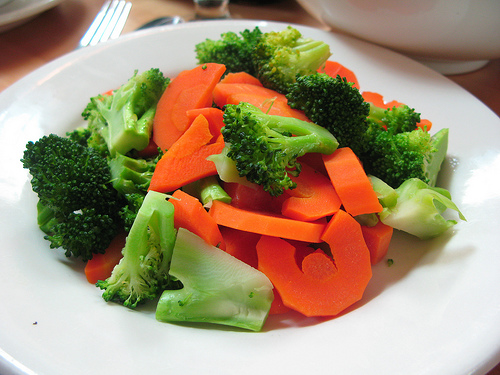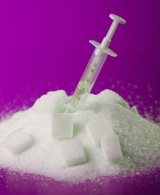~ from Dr. Ron Cherubino ~ The year was 1944. World War II was raging…
Helping your Immune System
~from Dr. Chris~
This time of year everyone is worried about getting sick. Not only because the symptoms are terrible, but because no one can afford the time it takes to properly and completely recover. Just last week I staved off sickness and I thought it might be nice to share the steps I take when I feel the first sign of sickness coming on.
A Little Background
Most people have a particular type of sickness that they are predisposed to getting. It could be one with intestinal distress or upper respiratory infection, but chances are, it’s his/her “default” sickness. This sickness could be considered the expression of a hereditary weakness. Growing up, mine was always throat and sinus related. Through all of high school I would cycle between relative normalcy and raging sore throats. It wasn’t until I went to college and graduate school that I started to learn how to deal with my particular type of sickness before it became a schedule-ruining disaster.
As a caveat, there is a very small window in which to apply these methods–probably 2 or 3 hours after the onset of the first symptoms. That means you need to know what your signs are. For example, my first sign is a burning feeling in my maxillary sinuses (behind my nose). That being said, here are the things that work for me:
1. Go Home
On Tuesday of last week, I started to feel that familiar feeling behind my nose. This is the sign that I need to get home. I packed up my things, rearranged my schedule, and got into my car. This isn’t reasonable for all people, but if you have the option, this is always your best bet. Your body needs to be able to use what energy it has to fight the invading bacteria or virus, not to keep you working.
2. Take a Shower
Just as we wash our hands to prevent the spread of bacteria, we should wash our entire bodies. The same microbes that hang out on our hands are also on the other parts of our bodies that are exposed and on the outside of clothes that we wear out in public. It is important to get rid of all these as quickly as possible so your immune system can focus on fighting whatever invader has already made it inside. These other germs will use this opportunity to sneak inside your body while its defenses are down, in fact, the sicknesses they cause are called “opportunistic infections.” So take a quick shower and put on clean clothes.
3. Go to Sleep
Later on in a sickness, it might be hard to sleep. It could be because your nose is completed stuffed up or because you need to vomit, but during this pivotal time, it should be relatively easy to fall asleep. Your body is buring through a LOT of energy to begin to produce specific immune cells like lymphocytes and neutrophils–all of this takes extra work and, therefore, extra energy. Sleep is the most important thing during any infection.
4. Drink Water
In general, people need to drink more water. It is often difficult to remember to drink as much as we need. It’s not an exact science, but I use the ratio of 1L to every 50lb of body weight, and I round up. So a 135lb person should drink approximately 3L of water per day. During the beginning phase of my sickness, I add another liter. To assist in the immune process, your body needs extra water to filter poisons out through the kidneys and liver.
5. Eat Steamed Vegetables
As soon as I wake up from the nap I’ve forced myself to have, I start shoveling in as many steamed vegetables as I can stand. This is helpful for two reasons: First, vegetables are full of important vitamins and minerals, which will help your body cope with all the new demands being placed upon it. Second, vegetables are the best source of insoluble fiber, which does not get broken down in the stomach. Instead, it helps to move waste through the large intestine to be eliminated. It is imperative that this happens since many of the immune cells you need right now are produced in the intestines and cannot be accessed if waste is becoming impacted there.
With any luck, you will wake up the next morning feeling a little tenuous, but certainly not on your way to a bigger sickness. Of course, there are exceptions, but I have prevented several sicknesses this year using this method.
There are also a few things to specifically avoid. Most of them are habits that people typically do during sickness:
1. Eating Soup (and anything else that is salty)
Broth can be helpful during sicknesses, especially ones where keeping down food isn’t an option. However, most soup and broth is full of salt, which is damaging to mucous membranes like the ones in your sinuses and throat. It also causes widespread inflammation, which just gives your body more messes to clean up while it should be focused on fortifying your immune system.
2. Using Cough Drops
These little lozenges are usually little more than candy. In general, they are full of sugar. I’m not going to go into all the horrible qualities of sugar in this blog, but it is basically the new cigarette, in my opinion. If your throat is burning, try a tablespoon of raw honey instead. It is naturally antibacterial and will take the edge off your pain.
3. Taking Symptom-Relieving Medications
The only time I take medication during a sickness is when it has gotten really bad and I can’t breathe through my nose to sleep. Remember, I said sleep is the most important aspect of getting well? If you literally can’t sleep, then a decongestant is passable, but in general, they are awful. Here’s why: the symptoms that you experience during a cold are the result of your body producing millions of extra white blood cells to fight off the inciting organisms. By using anti-histamines and other decongestants or even pain relievers, you are stopping your body’s efforts to build these cells. Therefore, when the drug wears off, your body will have to start again. Usually, a sickness that runs its course without pharmacological intervention is about 1/2 as long as it would be with daily medication use.
6. Eating “normal” food
Your body has a big job to do. Let it do it without making it digest a bunch of junk. By “junk,” I mean anything that has sugar, flour, dairy, or salt in it, as well as other processed grains like corn or potato. Basically, a rule of thumb to eating while sick is to make it boring. Just vegetables, with a few non-salt spices for taste.
5. Going on with Life as Usual
This might be unavoidable depending on what you have going on. In general, though, whatever you can get out of, do it. In our society, we tend to see rest as weakness, but it is really the most important thing your body can have.
The above information is not meant to replace any specific instructions given to you by a healthcare professional. Please consult a physician for specific questions.




